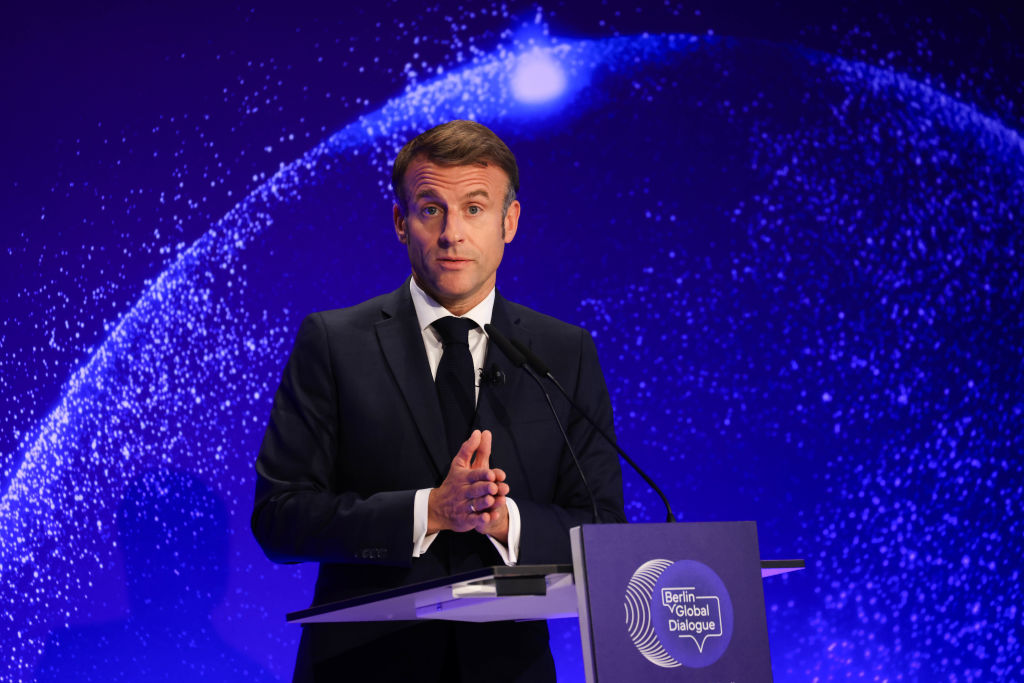Emmanuel Macron is no stranger to attention-grabbing one-liners. He once famously declared Nato to be “brain-dead”. Now, he has claimed that the European Union is in mortal danger.
Speaking to Bloomberg this week, the French President argued that the “EU could die”, adding: “We are overregulating and underinvesting. In the two to three years to come, if we follow our classical agenda, we will be out of the market.”
This analysis will not be new to the Euro-nerds who have read the 400 pages of Mario Draghi’s blockbuster report on EU competitiveness, or at least skimmed through its mercifully short summary. According to the document, the EU does not invest enough, lacks innovative superpowers, and has been too naive in defending them from international competitors.
Macron cannot be accused of not taking Europe’s future seriously enough, having already warned last year about the continent’s impending demise. When he argues that both the United States and China are violating international trade rules, he can point out dozens of previous speeches in which he has already made that case. What’s more, he has pushed for European reform as far back as his landmark 2017 Sorbonne speech.
But this Bloomberg interview is trying to paper over contradictions in Macronist thinking on Europe and regulation. Macron’s focus on the EU’s “strategic autonomy” also meant strong support for regulatory sovereignty and thus regulation, especially in the tech sector. The French President’s man in Brussels, former Commissioner for Internal Market Thierry Breton, soon became the face of the EU’s regulatory drive, most recently with the European Parliament’s AI Act. And yet these very same regulatory initiatives are directly targeted by Draghi as harming Europe’s innovative landscape.
More importantly, though, Macron’s main problem is that his speeches are reaching a dwindling audience. His kamikaze decision to dissolve parliament has seriously hampered his political capital and forced him to cobble together a fragile minority government led by the centre-right Prime Minister Michel Barnier.
Simultaneously, his incapacity to rein in France’s deficit to anywhere near the 3% GDP target — the government now fears slippage beyond 6% in 2024 — has provoked concern in Brussels. As a former top Eurocrat once said: “France is France”, and as such will likely avoid the fiscal penalties and kowtowing reserved to smaller eurozone countries, but this fiscal debacle is certainly not improving the country’s credibility.
Really, Breton’s brutal ejection from Ursula von der Leyen’s future Commission last month was a brazen confirmation of France’s declining continental clout. Breton was Macron’s pick for the Commission and received the sack from von der Leyen, who back in 2019 was portrayed as the most Macron-friendly head of the Commission that the French President could have hoped for.
In many ways, Europe has become more Macronist. During the pandemic, the €750-billion Covid-19 recovery fund and the introduction of a common debt instrument were hailed as Europe’s “Hamiltonian moment”. European defence spending is now at a post-1989 high. But, even then, it could be argued that Macron has been more a visionary of strategic autonomy than its actual architect. It was not Macron but Vladimir Putin who forced Europeans to confront their energy dependence on Russia, while it was Covid which made clear the dangers of Europe’s reliance on Chinese goods.
While Macronism as a lyrical European one-man show has likely entered its twilight years, the one silver lining is that the new Paris government might be planting seeds for a more durable and profound form of French influence across the continent.
The choice of Benjamin Haddad as Minister for Europe is an especially interesting signal. A well-connected former think-tanker and a committed Macronist, Haddad has long argued that France relied too much on its executive and its diplomatic network to push its messages across Europe. France lacks creativity and coordination in its mobilisation of its various non-governmental forms of influences, including its think tanks, foundations, NGOs, multinationals and parliamentarians.
This new approach certainly lacks the panache of another grandiose Macron speech, but it might just pay higher dividends in the long run. In the meantime, France’s President will continue to try to shape the bloc’s future — and hope he will still have an audience.










Join the discussion
Join like minded readers that support our journalism by becoming a paid subscriber
To join the discussion in the comments, become a paid subscriber.
Join like minded readers that support our journalism, read unlimited articles and enjoy other subscriber-only benefits.
Subscribe